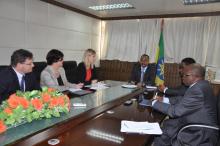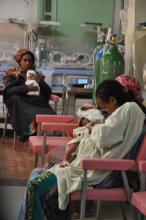French Members of Parliament Witness Ethiopia’s Health Success
Over the past 20 years, Ethiopia has risen from scoring the worst in global health indicators to a success story of expanding health services. Global development assistance is said to have been instrumental in this process of growing access to primary health care.
“Ethiopia was the worst place for women and children, but now the picture has changed - our women are surviving and our children thriving. We met MDGs three years ahead”, said H.E. Dr Kesetebirhan Admasu, Ethiopia’s Minister of Health, to the French Members of Parliament visiting the country from 9 to 12 July 2015. The parliamentarians came to Ethiopia to learn more about how partners’ financial contributions to the Ethiopian health sector are making a difference in people’s lives.
The Minister of Health explained that Ethiopia has reduced its child mortality rate significantly. One in five children used to die before their fifth birthday. Maternal mortality has also reduced from 1400 to 420 per 100,000 live births. The number of women who give birth at health facilities increased from only 10% to 60% in just four years. Malaria, which used to be frequent in an epidemic proportion, is not even on the top five causes of mortality. The rate of HIV infection is reducing by more than 90%. “All the progress was made possible because of the innovative way we used the development assistance to improve the health system of the country,” Dr Kesetebirhan said.
Five years ago, Ethiopian government introduced the health extension programme to provide a range of services to the rural community. The government has trained over 40,000 health extension workers and constructed 16,000 health posts since the programme began. Over 3000 health centres have been constructed; half of them supported by GAVI, Global Fund and bilateral donors including UKAID and USAID.
The French parliamentarians also met with H.E. Dr Kebede Worku, State Minister of Health, and members of country coordination mechanism and Inter agency coordination committees for immunizations. Dr Kebede highlighted that Ethiopia used the Global Fund, GAVI and MDG Pooled Fund to match the government budget to expand health services across the country.
In the coming days, the parliamentarians will meet multilateral and bilateral development partners and visit the country’s health structures including Gandhi Hospital, Ethiopian Public Health Institute, Ethiopian Pharmaceutical Supply Agency, as well as a health centre and a health post in Woliso district. WHO Country Office for Ethiopia facilitated the visit of the French Members of Parliament together with partners such as Global Health Advocate, Action Against Hunger and Volunteer Health Services (VHS).
The French delegation was composed of Jean-Mari Tetart, National Assembly, Member of Economic Affairs Committee, Chair of the Cooperation Development group; Christophe Bouillon, National Assembly, Vice Chair of the Sustainable Development Committee; Virgine Duby-Muller, National Assembly, Member of the Culture Committee, Chair of the France-Ethiopia Parliamentary group, Philip Gosselin; National Assembly, Secretary to the Law committee, Member of the France-Ethiopia Parliamentary Group, Vice chair of the Humanitarian Action Group; and Colette Capdevielle, National Assembly, Member of the Law Committee.
For more information, please contact
Dr Thomas Karengera
Routine Immunization Officer
karengerat [at] who.int" target="_blank">karengerat [at] who.int
or
Kibnesh Chala
Communications Officer (EPI)
WHO Ethiopia
Email: kibnesh [at] gmail.com" target="_blank">kibnesh [at] gmail.com
Photos: WHO Ethiopia/ Kibnesh C.




